Overview
In-home caregiving services play a vital role in helping seniors maintain their independence and enhance their quality of life. By providing tailored support for daily activities, companionship, and medical care, these services address the emotional and practical needs of both seniors and their families.
Imagine the peace of mind that comes from knowing your loved one is receiving the care they deserve. These services not only enrich the lives of individuals but also lighten the load for family caregivers. With various types of assistance available, it’s essential to consider safety, trust, and financial planning when selecting the right care for your loved ones.
We understand that this journey can feel overwhelming, but you are not alone. Your comfort is our priority, and we’re here to support you every step of the way. By choosing the right in-home caregiving service, you can ensure that your loved ones receive compassionate care tailored to their unique needs.
Let’s work together to create a nurturing environment that fosters independence and well-being. Reach out today to learn more about how we can help you and your family find the perfect caregiving solution.
Introduction
In-home caregiving has emerged as a vital solution for individuals seeking to maintain their independence while receiving essential support within the comfort of their own homes. This multifaceted approach not only includes assistance with daily activities such as bathing and meal preparation but also emphasizes the emotional and psychological well-being of seniors. As families navigate the complexities of care, they increasingly recognize the profound benefits of tailored in-home services that enhance quality of life and alleviate the burdens on family caregivers.
As the landscape of in-home care evolves, understanding the types of services available, ensuring home safety, and building trust between caregivers and clients becomes paramount. We understand that this journey can be overwhelming, but rest assured, we are here to support you every step of the way. This article delves into the intricacies of in-home caregiving, offering insights into its significance, challenges, and the transformative role it plays in the lives of seniors and their families.
What is In-Home Caregiving?
In-home caregiving services encompass a range of options designed to help individuals maintain their independence in the comfort of their own homes. This vital support allows them to receive assistance with daily tasks such as bathing, dressing, meal preparation, and medication management. Caregivers can be professional aides or family members, and services are tailored to meet the unique needs of each individual, ensuring comfort and safety in a familiar environment.
This compassionate approach significantly enhances the quality of life for seniors, enabling them to remain in their cherished homes, surrounded by beloved belongings and memories. Moreover, in-home caregiving services alleviate the burden on family caregivers, allowing them to focus on providing emotional support and companionship. This transition is crucial, as research indicates that 14.1% of home health occurrences lead to patient hospitalization or emergency room visits. Efficient in-home support is essential to avert such outcomes, highlighting the multifaceted advantages of caregiving services that extend beyond physical assistance to include emotional and psychological wellness.
Geriatric specialists emphasize that personalized support can lead to improved mental health outcomes for seniors, fostering a sense of autonomy and dignity. At Best Care Nurses Registry, our attendants are thoroughly vetted and committed to excellence, ensuring your loved ones experience healthy, meaningful days at home. With a typical base wage of $15.65 per hour for certified caregivers, families can access professional assistance that is both economical and efficient compared to other support options.
Recent advancements in in-home caregiving have further enhanced their appeal. For example, Best Care Nurses Registry offers flexible scheduling and concierge programs that ensure 24/7 access to nursing care. These innovations not only improve care delivery but also provide families with reassurance, knowing their loved ones are supported around the clock.
In summary, in-home caregiving services are an essential resource for seniors, offering customized support that fosters independence and enhances overall well-being. By understanding the key offerings of in-home caregiving services and recognizing their various advantages, families can make informed choices that prioritize the happiness and well-being of their loved ones. Best Care Nurses Registry stands out in this field due to its commitment to individualized attention and adaptability, ensuring clients receive the highest quality support.
To learn more about how we can assist you and your loved ones, we invite you to contact Best Care Nurses Registry today at (888) 203-2529 to schedule a consultation.
Types of In-Home Care Services Offered
In-home caregiving services encompass a variety of options designed to meet the diverse needs of elderly individuals and those requiring assistance. At Best Care Nurses Registry, we provide comprehensive support through several types of assistance:
- Personal Care: Essential support with daily living activities such as bathing, grooming, and dressing ensures individuals maintain their hygiene and dignity. Our dedicated staff offer personalized attention to help seniors feel comfortable and valued.
- Companionship: This service provides social interaction and emotional support, alleviating loneliness—an essential aspect of mental well-being, especially among seniors. Our caregivers engage in meaningful conversations and activities, enhancing the quality of life for those we serve.
- Skilled Nursing Care: Delivered by registered nurses, this service includes medical care like wound treatment, medication management, and continuous health monitoring, addressing the complex health needs of patients. We ensure seniors receive the medical attention they need in the comfort of their homes.
- Physical Therapy: Focused on aiding individuals in recovering mobility and strength after injuries or surgeries, physical therapy is vital for healing and maintaining independence. Our therapists collaborate closely with clients to develop personalized recovery plans.
- Homemaker Assistance: Our aides assist with household tasks such as cleaning, cooking, and laundry, allowing seniors to live in a tidy and organized environment without the burden of daily chores. This support helps create a safe and comfortable living space.
- Respite Services: These services provide temporary relief for primary caregivers, ensuring that loved ones receive quality support while caregivers take necessary breaks to recharge. This assistance is crucial for maintaining the well-being of family caregivers.
Each type of support can be tailored to match individual needs, preferences, and health conditions. With approximately 14 million Americans over the age of 80 receiving support at home, the demand for personalized in-home assistance is significant. Furthermore, as one in four adults over 65 experiences a fall each year, the role of in-home caregiving services becomes increasingly critical in mitigating such risks.
This statistic underscores the importance of having skilled professionals available to assist in preventing accidents and ensuring safety at home.
Best Care Nurses Registry has been offering adaptable and compassionate in-home caregiving services since 1980, ensuring that seniors receive the support they need to maintain their independence and dignity. We offer various payment methods, with no minimum hours required, and assistance with long-term insurance claims to make our services accessible to all.
Recent trends indicate that about one-third of home health agencies are now incorporating telehealth options into their service delivery models, enhancing accessibility and convenience for patients. This shift reflects a growing recognition of the importance of technology in personal assistance and companionship, ensuring that seniors receive timely support and supervision. The integration of telehealth not only improves communication between caregivers and clients but also facilitates more effective management of health conditions.
Moreover, a recent survey revealed that 78 percent of patients would certainly recommend their home health agency to friends and family, highlighting the satisfaction and trust clients have in these services.
In conclusion, the landscape of in-home caregiving services is evolving, emphasizing personalized, adaptable support that addresses the specific needs of seniors and their families. The challenges posed by the COVID-19 pandemic have also demonstrated the resilience of the sector, as many adult day programs adapted to continue providing essential assistance during difficult times. This adaptability is vital for ensuring that seniors receive the care they need, regardless of external circumstances.
If you or someone close to you could benefit from our services, please call (888) 203-2529 to arrange a conversation and discuss your needs.
Ensuring Home Safety for Seniors
Creating a safe home environment for seniors through in-home caregiving services is vital in preventing accidents and fostering independence. With nearly 3 million emergency department visits recorded for older adult falls in 2021, the need for effective home safety measures is more pressing than ever. Here are some essential safety measures to consider:
- Remove Tripping Hazards: Clear pathways of clutter, eliminate loose rugs, and secure electrical cords to minimize the risk of falls.
- Install Grab Bars: Strategically place grab bars in bathrooms and near stairs to provide essential support and stability.
- Improve Lighting: Ensure all areas of the home are well-lit, particularly stairways and hallways, to enhance visibility and reduce accidents.
- Emergency Preparedness: Keep emergency numbers visible and consider implementing a medical alert system for quick access to help in case of emergencies.
- Regular Maintenance: Conduct routine checks for hazards, such as loose railings or uneven flooring, and address any issues promptly.
As Alex Hoehn-Saric, CPSC Chair, highlights, “It’s a fact that older adults are far more likely to experience a significant injury, or fatality, from the hidden hazards associated with consumer products in their homes than other age groups.” This underscores the critical need for effective safety measures.
In addition to these safety measures, it’s important to evaluate if your elderly loved one may benefit from in-home caregiving services, including CNA/HHA assistance. Signs such as difficulty with personal hygiene, dressing, or managing medications can indicate the need for professional support. The caregivers referred by Best Care Nurses Registry are not only trained to provide personal care but also to ensure a safe and supportive environment, alleviating stress for family caregivers.
Furthermore, expert recommendations emphasize the importance of co-design strategies that involve older adults in developing user-friendly preventive measures for home hazards. This approach enhances usability and ensures that safety modifications are tailored to the unique needs of seniors. A recent study noted the complexities involved in older adults’ preventive behaviors regarding home hazards, highlighting that living alone may reduce motivation to act on safety measures.
Thus, focused initiatives, including companionship support, are vital to improve home safety and emotional wellness, especially for individuals in at-risk circumstances. By implementing these safety measures and considering support services, families can create a secure living space that empowers seniors to thrive at home.
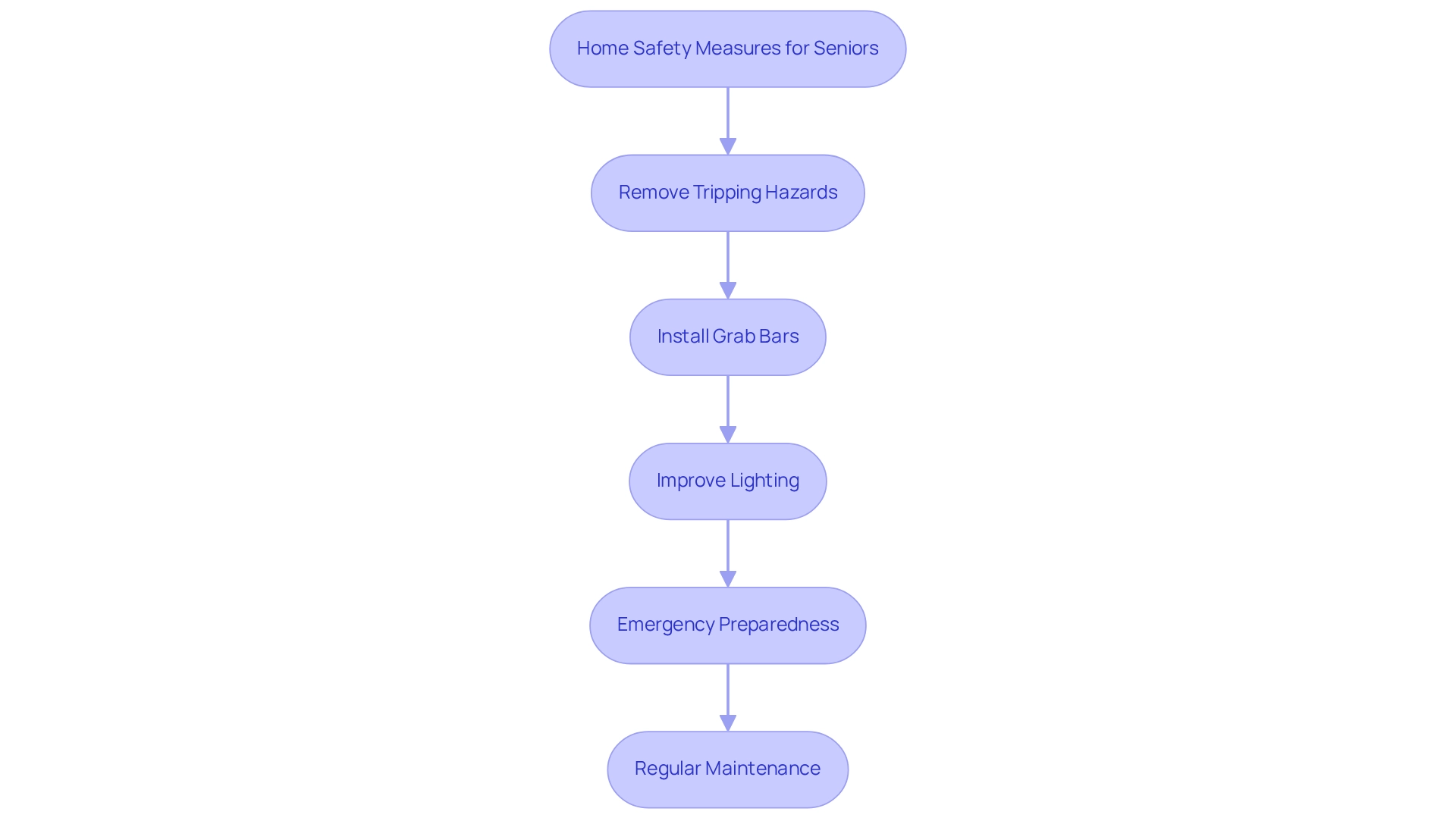
Challenges Faced by Family Caregivers
Family supporters often face a variety of considerable difficulties that can affect their well-being and the standard of care they deliver. These challenges include emotional stress, physical strain, time management issues, financial pressure, and social isolation.
Emotional Stress: Caregiving can lead to intense feelings of guilt, anxiety, and frustration. Research indicates that unpaid supporters for older adults are more than three times as likely to experience suicidal thoughts or turn to substance use as a coping mechanism, especially during challenging times such as the COVID-19 pandemic. According to the Centers for Disease Control and Prevention, this rise in mental health challenges emphasizes the urgent need for assistance among those who provide care. Best Care Nurses Registry provides tailored respite support services in home caregiving, offering companionship and assistance with daily activities such as bathing, grooming, and meal preparation, which can help alleviate some of this emotional burden.
Physical Strain: The physical demands of caregiving—such as lifting, moving, and assisting loved ones—can result in fatigue and even injury. Statistics show that those providing care often encounter increased rates of physical issues due to the demanding nature of their duties. Furthermore, the proportion of adults under 65 years without health care coverage declined by 5.1 percentage points for those providing assistance from 2015–2016 to 2021–2022, highlighting the financial pressures that can accompany such roles. With round-the-clock assistance available, Best Care Nurses Registry ensures that support providers in home caregiving can share responsibilities, reducing the physical strain on individual family members.
Time Management: Balancing caregiving duties with personal and professional obligations can be overwhelming. Many supporters express feeling overwhelmed, grappling to discover time for their own requirements and passions, which can worsen sensations of tension and exhaustion. The flexible services offered by Best Care Nurses Registry in home caregiving allow caregivers to customize support according to their schedules, helping them manage their time more effectively.
Financial Pressure: The financial implications of caregiving can be substantial. Caregivers frequently face costs related to medical expenses and may experience lost wages due to reduced work hours or the need to leave their jobs entirely. This financial strain can add another layer of stress to their caregiving role. Best Care Nurses Registry accepts most long-term care insurances directly, assisting families in navigating payment options for in home caregiving services, including completing an Assignment of Benefits (AOB) form, which allows the insurance carrier to pay Best Care directly. This support can reduce out-of-pocket expenses, alleviating some financial burdens.
Social Isolation: The requirements of providing care can result in social isolation, as those who give support may struggle to sustain connections with friends and family. This isolation can further contribute to emotional distress, making it essential for those providing care to seek out support networks. Significantly, 79% of those providing assistance report obtaining information, support, or guidance from health professionals during their most recent health problem, highlighting the value of these relationships. By offering companionship and emotional assistance, Best Care Nurses Registry supports those who provide care in sustaining social connections and alleviating feelings of isolation through in home caregiving services.
Acknowledging and comprehending these challenges is essential for families to pinpoint the needed support and resources that can assist them in handling their caregiving responsibilities efficiently. The National Strategy to Support Family Caregivers details objectives like offering respite assistance and enhancing financial and workplace stability for caregivers, signaling a transition towards acknowledging and tackling the difficulties encountered by caregivers in the U.S. By confronting these challenges, caregivers can enhance their own well-being while ensuring their loved ones get the highest quality support.
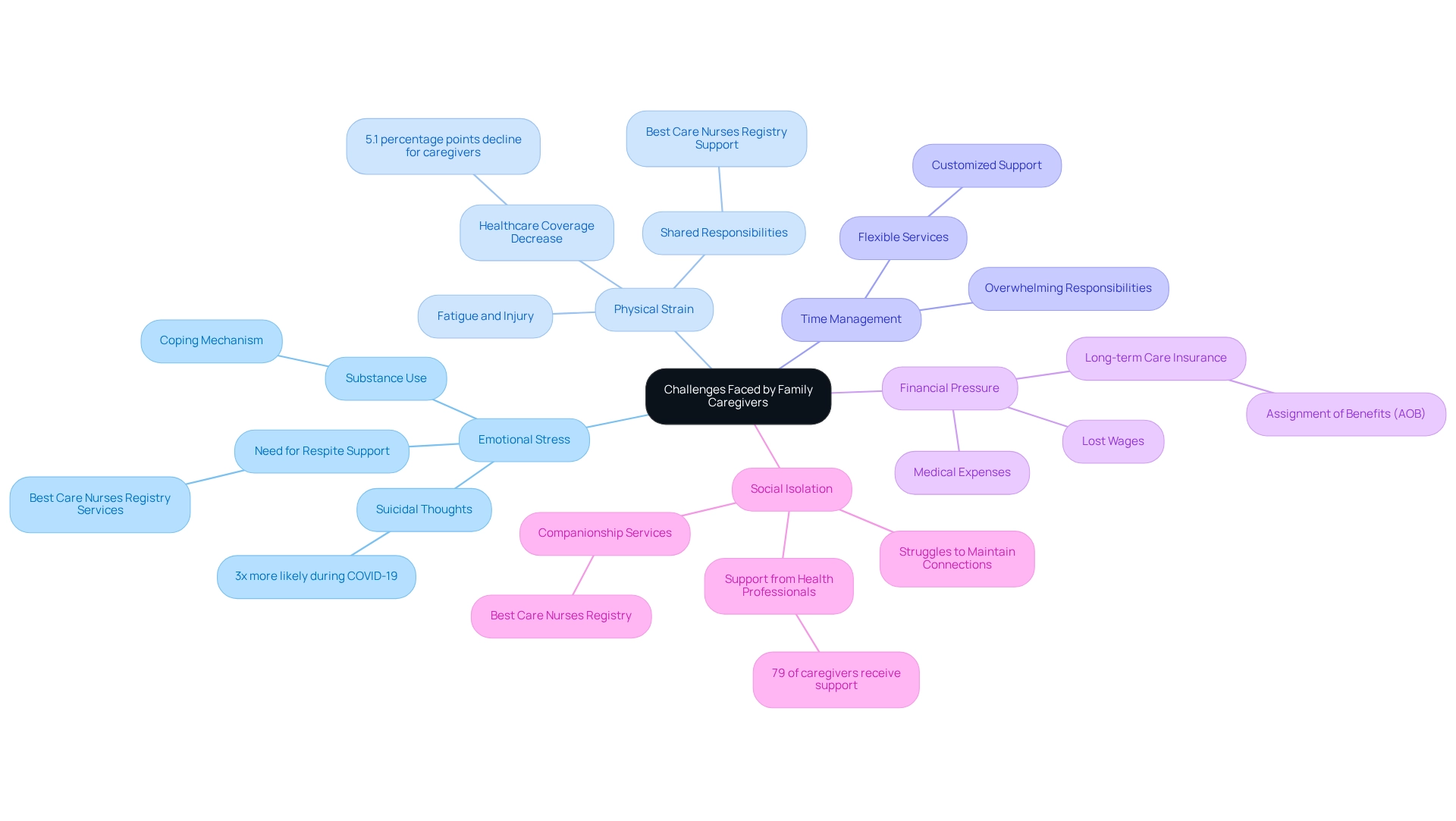
Understanding In-Home Care Costs and Insurance
The expenses of in-home caregiving services can vary significantly based on the type of support required, the level of attention needed, and geographic location. Understanding these factors is crucial for families as they navigate future assistance needs.
Hourly rates for in-home caregiving services typically range from $25 to $35 per hour, reflecting the complexity of care required. As the demand for elderly support options continues to rise, it becomes increasingly important for families to grasp the costs associated with in-home caregiving services.
Insurance Coverage: Medicare may cover certain home health services; however, it does not assist with activities of daily living, which are vital for many seniors. These activities include bathing, grooming, toileting, transferring, light housekeeping, and meal preparation. For qualified individuals, Medicaid can provide support with long-term care expenses. Additionally, many long-term insurance policies offer coverage for in-home caregiving services. At Best Care Nurses Registry, we accept most long-term support insurances directly on your behalf, streamlining the payment process through an Assignment of Benefits (AOB). Proactively assessing insurance coverage is essential, especially considering that 7 out of 10 individuals will require long-term support at some point in their lives.
Payment Options: Families should explore various payment avenues, including private pay, insurance claims, and financial assistance programs. At Best Care, we are here to help you contact your provider to review your policy coverage, ensuring you understand your payment options. This exploration can alleviate some of the financial stress associated with ongoing care. It is important to recognize that you will be responsible for any charges related to in-home caregiving services if your insurance does not cover all or part of the total bill.
Budgeting: Creating a comprehensive financial plan that considers ongoing care needs and potential cost increases over time is vital. With the aging population expected to heighten the demand for in-home caregiving services, understanding these trends is key to ensuring accessible and affordable options for seniors. As Marc Cohen, co-director for the Leading Age Long Term Services and Supports Center, notes, ‘The reason behind the notable rise in expenses for in-home caregiving services arises from shortages in the country’s home health workforce along with increasing wages for these workers.’ This underscores the importance of proactive financial planning, particularly with the elimination period that may apply to long-term support policies, indicating how long after activation you will need assistance before the policy begins to pay.
By understanding these financial factors, families can make informed decisions regarding in-home caregiving services, ensuring that their loved ones receive the necessary support while effectively managing expenses.
Building Trust Between Caregivers and Clients
Establishing trust between those providing support in home caregiving services and clients is essential for delivering effective care. Here are several strategies to foster this vital relationship:
- Open Communication: Promote candid conversations regarding desires, preferences, and concerns. Effective communication is fundamental, as it enables providers to comprehend the unique situations of each client, thereby customizing their approach to address specific needs. At Best Care Nurses Registry, our caregivers are trained to engage in meaningful discussions that help identify the optimal support strategies for each individual.
- Consistency: Caregivers should be reliable and consistent in their duties. This reliability fosters a sense of security, which is crucial for clients who may already feel vulnerable due to health issues. Our Private Duty RNs and LPNs are committed to delivering reliable assistance in home caregiving services, ensuring that clients feel secure and supported in their homes.
- Respect and Empathy: Demonstrating respect for the client’s dignity and showing empathy towards their feelings and experiences can significantly enhance trust. Providers who recognize the emotional elements of support assist clients in feeling appreciated and comprehended. At Best Care, we emphasize the importance of compassionate care, recognizing that emotional support is just as vital as physical assistance.
- Personal Connection: Taking the time to get to know the client on a personal level can help build rapport. This connection not only enhances trust but also improves the overall caregiving experience, as clients are more likely to open up about their needs and preferences. Our support staff endeavor to cultivate a welcoming and encouraging atmosphere, promoting companionship that enhances the lives of our clients.
- Feedback Mechanism: Establishing a system for clients and families to provide feedback on care ensures that their voices are heard. This practice not only empowers clients but also allows caregivers to adjust their methods based on real-time input, further strengthening the caregiver-client bond. Best Care Nurses Registry actively promotes feedback to consistently enhance our offerings and ensure that we meet the unique needs of each client.
- Testimonials: Hearing from other clients about their positive experiences with Best Care Nurses Registry can provide reassurance and build trust. We encourage clients to share their stories, which can help potential clients feel more confident in choosing our services.
- FAQs: We understand that families often have inquiries about in-home caregiving services. Frequent questions consist of how to assess if a family member requires assistance and what elements to weigh when choosing a support provider. Our team is always available to address these concerns and provide guidance.
These practices can significantly enhance the caregiver-client relationship, leading to improved outcomes for both parties. Research indicates that strong relationships can prevent the sense of isolation many seniors experience, thereby reducing the risk of depression and other mental health issues. As Eric Thomas noted, “Strong relationships can prevent the sense of isolation many seniors experience, reducing the risk of depression and other mental health issues.”
By prioritizing trust and communication, staff at Best Care Nurses Registry can create a supportive environment that promotes the well-being of their clients.
With its extensive experience and strong reputation in South Florida since 1980, Best Care Nurses Registry exemplifies these trust-building strategies in action. However, it is important to acknowledge the limitations of studies on trust dynamics, as they often involve small sample sizes and may not fully capture the complexities of caregiver-client relationships. Future studies should investigate how trust evolves over time and among various types of providers, highlighting the importance of continuous relationship-building in caregiving.
How to Choose the Right In-Home Caregiver
Choosing the right in-home caregiving services is a vital decision that can significantly impact the quality of care your loved one receives. It’s understandable to feel overwhelmed; however, following these essential steps can guide families through this important process.
Evaluate Requirements: Begin by identifying the specific needs of your loved one. Understanding their medical conditions, personal care needs, and any special preferences is crucial. If they struggle with personal hygiene, dressing, cooking, cleaning, or managing medications, it may indicate a need for CNA/HHA support services. A thorough evaluation ensures that the provider can offer personalized care tailored to those needs.
Research Options: Take the time to explore local agencies and independent providers. Investigate their credentials, certifications, and reviews from other families. This research is vital, especially considering that the economic value of unpaid assistance provided by family caregivers is estimated at $600 billion each year. This statistic underscores the importance of professional assistance in home caregiving services, as hiring qualified individuals can ease some challenges families face while ensuring chronic conditions are effectively monitored.
Furthermore, understanding the differences between CNAs (Certified Nursing Assistants) and HHAs (Home Health Aides) is essential. CNAs typically undergo more extensive training focused on medical procedures, while HHAs concentrate on personal assistance and daily living tasks.
Interview Candidates: Conduct thorough interviews with potential caregivers. This is your chance to assess their experience, communication skills, and compatibility with your loved one. Consider asking about their approach to care and how they handle challenging situations. Expert opinions suggest that compatibility between providers and clients is crucial for effective support, fostering trust and comfort.
According to the National Alliance for Caregiving and AARP, 47% of caregivers have an annual household income of less than $50,000. This highlights the importance of choosing individuals who are not only qualified but also financially stable, as this can influence their reliability and quality of care.
Check References: Always request and verify references. Speaking with former clients can provide valuable insights into a provider’s reliability and quality of care. The statistic regarding caregiver income emphasizes the need for families to ensure they select individuals who are both qualified and financially stable, as this can impact the level of care provided.
Trial Period: Implement a trial period to observe how well the caregiver interacts with your loved one. This allows both parties to adjust and assess compatibility before making a long-term commitment. Community-driven programs have shown that such initiatives can enhance the well-being of support providers and foster a sense of community, benefiting both caregivers and clients. These programs often offer resources, relief support, and social connections, leading to improved outcomes for everyone involved.
By following these steps, families can find a caregiver through in-home caregiving services who is not only qualified but also a good fit for their loved one’s personality and needs. This ultimately enriches the caregiving experience and enhances their quality of life. It’s also essential to consider the risks seniors face without CNA/HHA assistance, such as health declines, poor nutrition, hygiene issues, mobility challenges, social isolation, household hazards, and medication management. These factors further emphasize the necessity of professional caregiving.
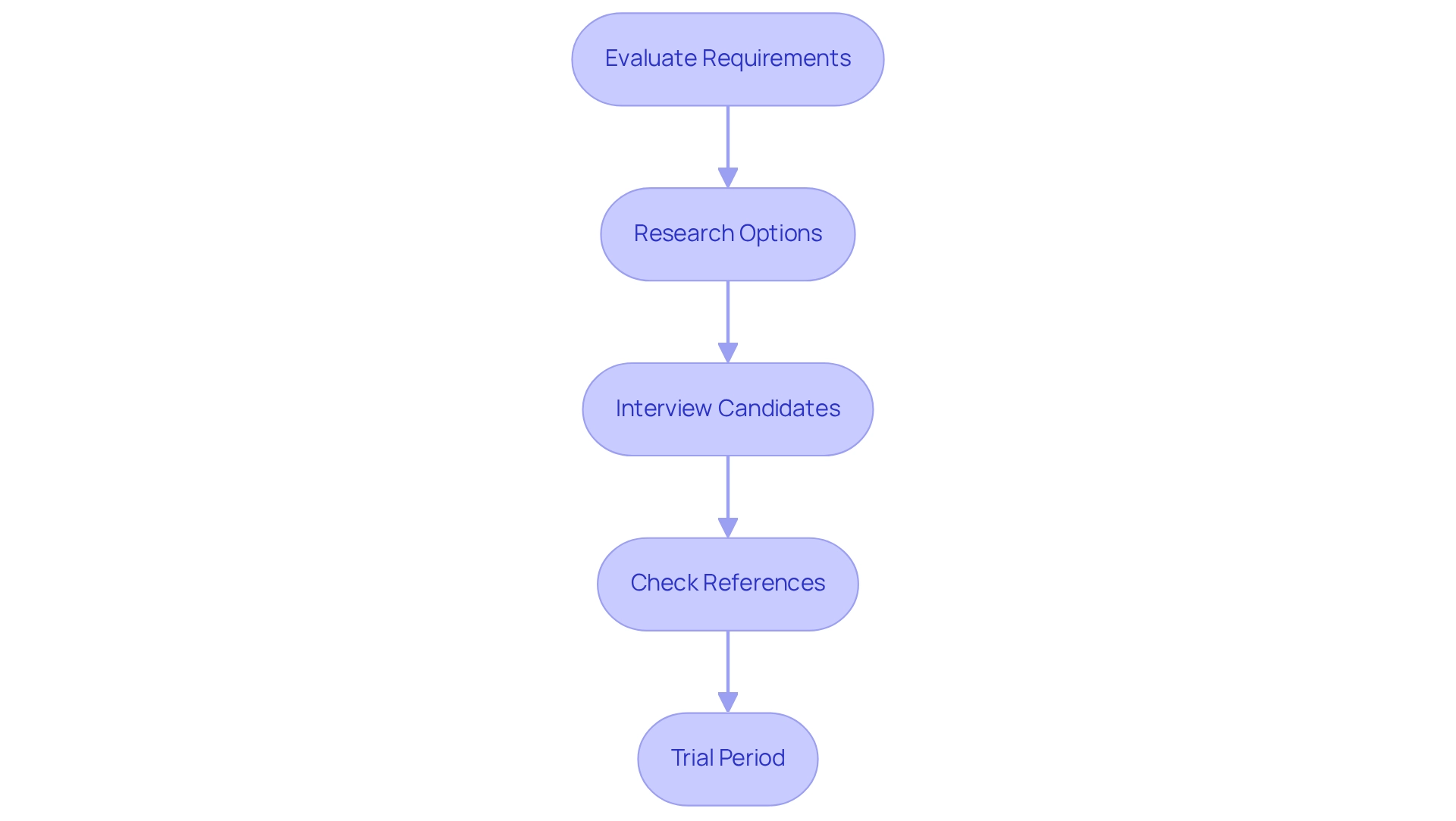
Leveraging Technology in In-Home Care
Technology is transforming in-home caregiving services, offering crucial tools that significantly enhance the support experience for seniors and their families. When combined with the tailored services from Best Care Nurses Registry, these advancements create a nurturing environment for those in need.
Telehealth Services: Imagine having the ability to consult with healthcare providers from the comfort of home. These platforms minimize the need for travel, ensuring timely medical advice, which is especially beneficial for seniors with mobility issues or those living in remote areas.
Medication Management Apps: These applications empower individuals and clients to monitor medications and schedules effectively. By decreasing the chance of missed doses, they ensure compliance with treatment plans, which is vital for managing chronic conditions. This not only offers reassurance for family members but also enhances the overall well-being of their loved ones.
Wearable Devices: Wearables that track health metrics, such as heart rate and activity levels, provide guardians with valuable insights. This information aids in making informed decisions about a senior’s health and well-being, ultimately enhancing their quality of life and independence.
Smart Home Technology: Innovations like smart lights and security systems enhance safety and convenience for seniors. These technologies help prevent accidents, allowing seniors to maintain independence in their homes while alleviating family members’ concerns.
Communication Tools: Video calls and messaging apps foster regular interaction between supporters and family members. This connectivity is essential for emotional well-being, helping families stay updated on their loved ones’ health and support requirements. It strengthens the emotional comfort that arises from knowing they are secure and supported.
The incorporation of these technologies not only enhances the quality of assistance but also improves the overall experience for both caregivers and clients. For instance, integrating Electronic Visit Verification (EVV) systems fosters transparency between caregivers and clients, highlighting the importance of technology in enhancing service quality and accountability. As payors focus on quality health, prompt delivery, and accessibility through technology, utilizing these advancements will be crucial in addressing the increasing need for home health support.
Furthermore, the shift towards value-oriented services demonstrates how technology aids in achieving better outcomes, with reimbursement becoming progressively reliant on the quality of services provided. As the demand for in-home caregiving services continues to rise, leveraging technology alongside the personalized support solutions from Best Care Nurses Registry will be vital in ensuring improved health outcomes for seniors. We’re here for you, ensuring your comfort is our priority.
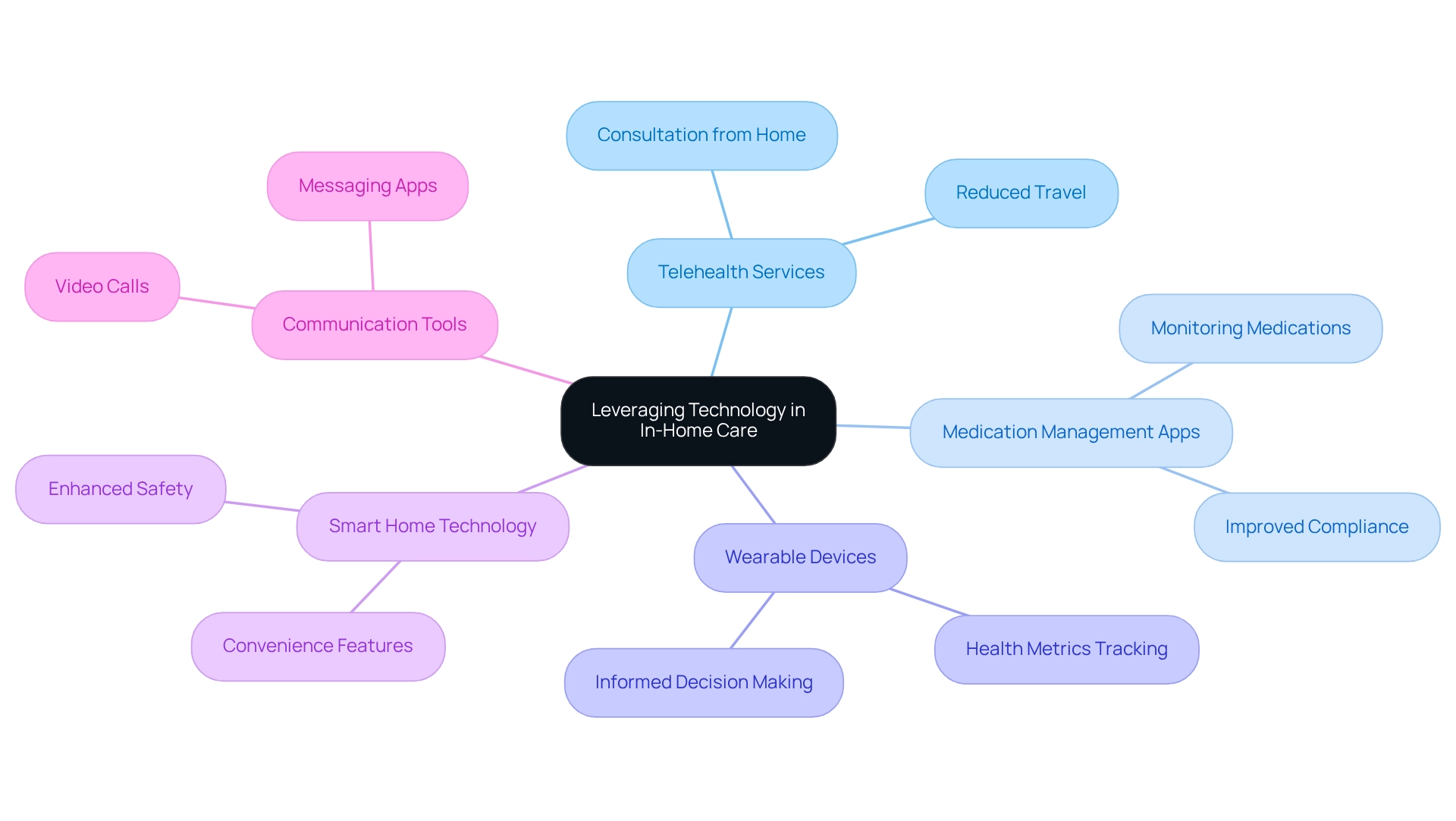
The Importance of Respite Care for Family Caregivers
Respite services provide crucial temporary relief for family supporters, allowing them to rejuvenate and maintain their well-being. At Best Care Nurses Registry, we offer personalized respite support services designed to meet the unique needs of each family. The benefits of respite care are multifaceted:
- Prevention of Burnout: Regular breaks are essential in helping caregivers avoid the physical and emotional exhaustion that often accompanies continuous caregiving. As noted by Shi Yan, MD, the burden on caregivers can significantly impact their overall health and well-being.
- Enhanced Concentration: Taking a break from caregiving duties enables individuals to return with revitalized energy and a fresh perspective, improving their capacity to tackle everyday challenges.
- Social Interaction: Respite support offers caregivers opportunities to engage socially, significantly diminishing feelings of isolation and loneliness. This is especially important considering that financial pressures have caused 7% of caregivers to relocate to more affordable housing, and 2% have faced eviction or foreclosure, underscoring the economic difficulties they confront.
- Quality of Attention: Well-rested caregivers are better equipped to deliver high-quality support, ensuring that their loved ones receive the attention and assistance they require. In fact, 66% of caregivers find it easy to organize the treatment recommended by health professionals, indicating that support systems are in place to assist them.
- Flexibility: Our respite assistance can be customized to suit the caregiver’s schedule, whether for a brief period or on a continuous basis, making it adaptable to various needs.
At Best Care Nurses Registry, we also provide long-term support for insurance to assist families in managing their policies and maximizing their benefits. A nursing evaluation is conducted on your initial date of coverage as part of your insurance daily benefit. Utilizing our in-home caregiving services not only aids family providers in maintaining their health but also enhances their effectiveness in their support roles.
A study titled “Emotional Well-Being of Individuals Caring for Dementia Patients” found that respite care positively affects the emotional state of caregivers, connecting it to the advantages mentioned. Ultimately, this approach benefits both caregivers and their loved ones.
To discuss your needs and schedule a call, please reach out to us at (888) 203-2529. We are here for you and are available to assist you through phone, Zoom, or FaceTime meetings.
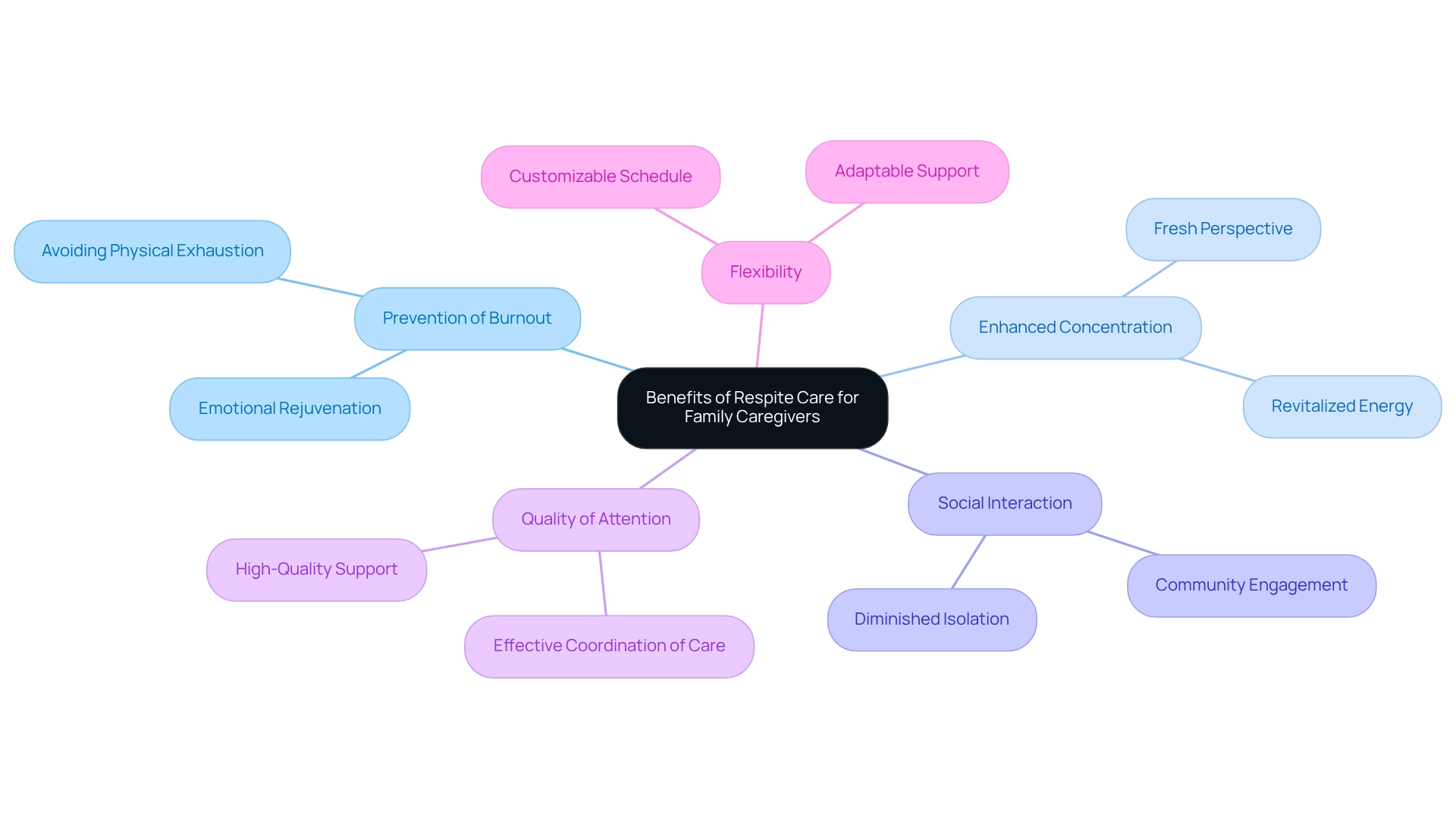
Key Takeaways for Families Considering In-Home Care
As families explore in-home support options, several essential considerations can guide them in making informed decisions:
- Understand Your Options: It’s important to familiarize yourself with the various types of in-home caregiving services available, such as personal assistance aides, skilled nursing, and companionship services. This knowledge will help you choose the most suitable option for your loved one’s specific needs, ensuring they receive personalized care tailored to their preferences.
- Prioritize Safety: Implementing safety measures within the home is vital. Did you know that one in four adults over 65 experiences a fall each year? This statistic highlights the importance of creating a safe living environment. Simple modifications, like removing tripping hazards and installing grab bars, can significantly enhance seniors’ quality of life and reduce the risk of accidents.
- Recognize Challenges: Family caregivers often face emotional and physical challenges. Acknowledging these difficulties is the first step toward seeking support. Research shows that one in three adults aged 50-80 report feelings of isolation, with 5% feeling lonely often. Connecting with support groups or professional services can alleviate some of this burden, emphasizing the need for emotional support for seniors and the importance of companionship in enhancing their overall well-being.
- Plan Financially: Understanding the costs associated with in-home caregiving services is crucial for effective budgeting. Families should explore different insurance options, including long-term support insurance, to help cover expenses. This proactive approach can ease financial pressure and ensure that quality support is accessible, allowing families to focus on their loved one’s needs without added concern.
- Build Trust: Establishing a reliable relationship between caregivers and clients is essential for effective assistance. Families should prioritize compatibility when selecting caregivers, as a strong rapport can lead to better outcomes. Information from home health service episodes shows that 87.3% of patients improved their mobility, underscoring the significance of a supportive caregiver-client relationship. Additionally, the growing demand for caregiving services is evident, with a projected need for 924,000 personal care aides and home health aides between 2021 and 2031, highlighting the importance of finding the right caregiver.
- Ongoing Monitoring: Continuous monitoring of patient health is crucial to prevent hospital admissions. Families should ensure that caregivers are attentive to changes in their loved one’s conditions, which can lead to timely interventions and improved health outcomes. Professional caregivers can provide essential medical monitoring and assistance within in-home caregiving services, addressing potential health declines before they escalate.
By considering these key factors, families can navigate the complexities of in-home caregiving services more effectively, ensuring their loved ones receive the compassionate and personalized support they deserve from Best Care Nurses Registry. For more information or to discuss your needs, call Best Care Nurses Registry at (888) 203-2529.
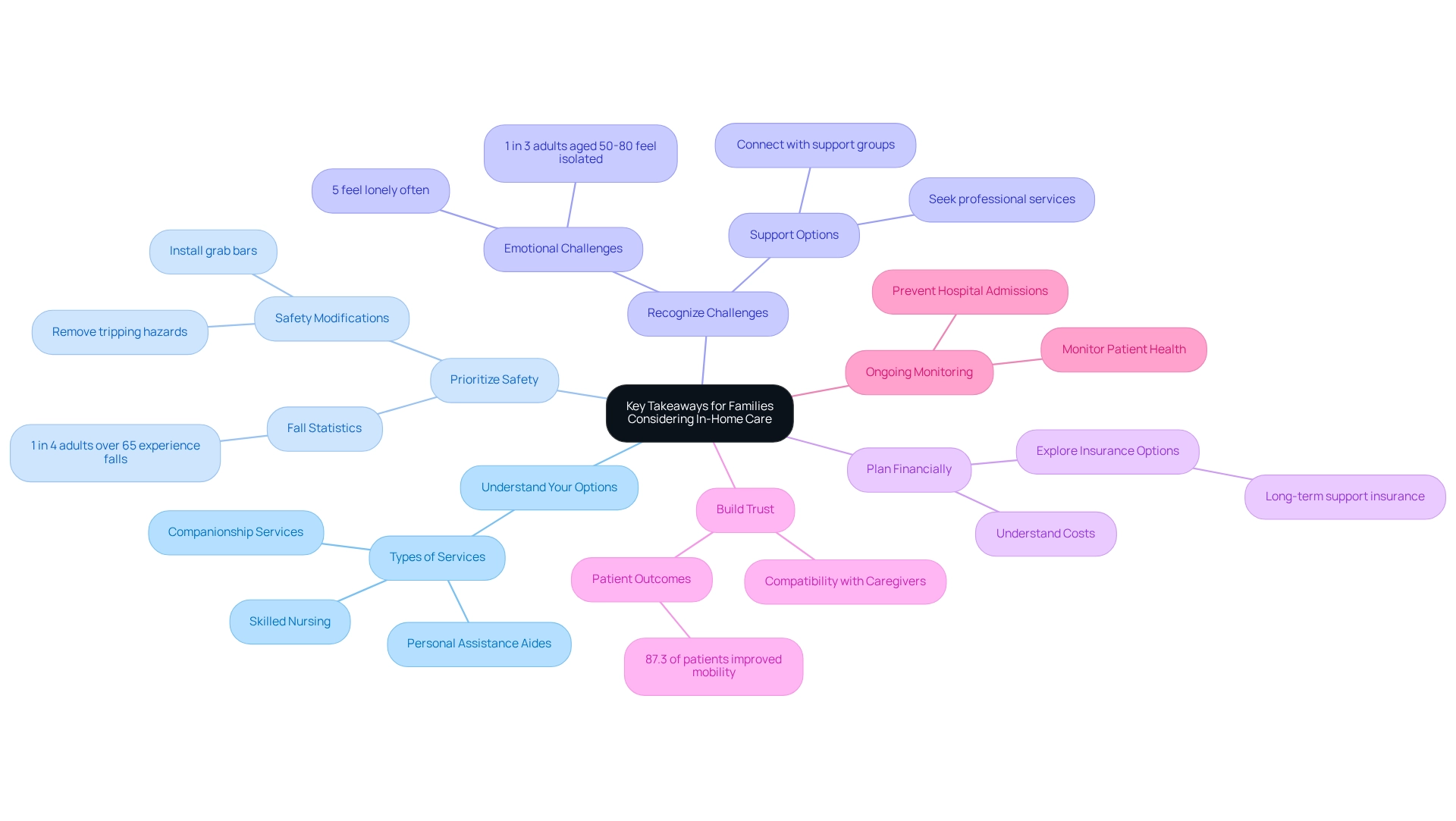
Conclusion
In-home caregiving plays a vital role in allowing seniors to maintain their independence while receiving essential support in a familiar setting. This approach not only assists with daily activities but also enhances emotional well-being, fostering dignity and autonomy. By utilizing personalized services, families can significantly improve their loved ones’ quality of life and ease the challenges they face.
Safety is paramount in in-home care. Families should implement proactive measures to create secure environments for their seniors. Simple modifications can reduce the risk of accidents, ensuring caregivers provide both support and safety. Additionally, understanding the financial aspects—such as insurance coverage and budgeting—is crucial for informed decision-making without added stress.
A trusting relationship between caregivers and clients is fundamental for effective care. Open communication, consistency, and empathy are essential for building this bond, which leads to better outcomes. Families should prioritize compatibility to ensure caregivers connect meaningfully with their loved ones.
As in-home caregiving evolves, leveraging technology and focusing on personalized care will be key to meeting the diverse needs of seniors. By embracing these practices, families can navigate the complexities of caregiving confidently. Remember, your loved ones deserve compassionate support that enhances their overall well-being, and we’re here for you every step of the way.
Frequently Asked Questions
What are in-home caregiving services?
In-home caregiving services provide a range of options designed to help individuals maintain their independence at home by assisting with daily tasks such as bathing, dressing, meal preparation, and medication management.
Who can provide in-home caregiving services?
Caregivers can be professional aides or family members, and the services are tailored to meet the unique needs of each individual.
How do in-home caregiving services benefit seniors?
These services enhance the quality of life for seniors by allowing them to remain in their homes, alleviating the burden on family caregivers, and supporting emotional and psychological wellness.
What types of assistance are offered through in-home caregiving services?
Types of assistance include personal care, companionship, skilled nursing care, physical therapy, homemaker assistance, and respite services.
How does personal care support seniors?
Personal care provides essential support with daily living activities, ensuring individuals maintain hygiene and dignity through personalized attention.
What is the role of companionship in in-home caregiving?
Companionship offers social interaction and emotional support, helping to alleviate loneliness and enhance the quality of life for seniors.
What does skilled nursing care involve?
Skilled nursing care includes medical services like wound treatment, medication management, and continuous health monitoring provided by registered nurses.
How does physical therapy assist seniors?
Physical therapy aids individuals in recovering mobility and strength after injuries or surgeries, helping them maintain independence.
What is homemaker assistance?
Homemaker assistance involves aides helping with household tasks such as cleaning, cooking, and laundry to create a safe and organized living environment.
What are respite services?
Respite services provide temporary relief for primary caregivers, ensuring that loved ones receive quality support while caregivers take necessary breaks.
How does in-home caregiving contribute to safety for seniors?
In-home caregiving services help prevent accidents and ensure safety at home, which is increasingly critical given the high number of emergency visits due to falls among older adults.
What are some recent advancements in in-home caregiving?
Recent advancements include flexible scheduling, concierge programs for 24/7 nursing care, and the incorporation of telehealth options to enhance accessibility and convenience.
How does Best Care Nurses Registry ensure quality in their services?
Best Care Nurses Registry thoroughly vets their attendants and is committed to excellence, providing personalized and adaptable support for clients.
What is the typical cost for in-home caregiving services?
The typical base wage for certified caregivers is approximately $15.65 per hour, making professional assistance economical compared to other support options.
How can families learn more about in-home caregiving services?
Families can contact Best Care Nurses Registry at (888) 203-2529 to schedule a consultation and discuss their needs.











